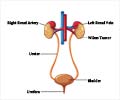An article appearing in the January issue of The Journal of Urology says that drugs used to treat gastrointestinal stromal cancers (GISTs) are likely to be ineffective for patients with full blown kidney cancer.
These findings are reported by investigators at the Mayo Clinic Cancer Center, who say that the drug in question is not going to help patients with high grade renal cell carcinoma. "While this finding does not seem like good news for patients with kidney cancer," said Bradley Leibovich, M.D., Mayo Clinic urologist and lead investigator of the study, "it does help us to narrow down the treatment options among the new targeted therapy drugs and would seem to indicate that resources for investigating potential new kidney cancer therapies may be better utilized on other options."The current study wanted to verify a previous study published in 2004 in The Journal of Clinical Pathology. They reviewed the data of all patients who had undergone partial or radical nephrectomy between 1970 and 2002. This study had found that kidney tumors often expressed KIT (a receptor kinase tyrosine) mutations. Another study appearing in The Journal of Urology had also reported on the prevalence of these type of mutations in kidney tumors. Dr. Leibovich's team wanted to verify these findings since these tumors are very aggressive and recur even after surgery. If the findings were corroborated, then new drugs could have been used in the treatment process. But the researchers found no evidence of this since only 4.5 percent of tumors exhibited KIT mutations. "Imatinib only would have had the potential to be helpful to that small percentage of patients that we found to have a KIT-positive tumor," says lead author Shomik Sengupta, M.D. "And even then it would only work if they also had specific mutations that would respond to the drug." These findings led the researchers to conclude that imatinib therapy could not be justified in all kidney cancer. "Tumors that express KIT but lack KIT mutations may not respond to imatinib and other researchers have shown that recently for adenoid and small cell lung cancers. Because we rarely found KIT expression and no KIT mutations, we cannot justify imatinib therapy," Dr Leibovich concluded.
John Cheville, M.D.; Christine Lohse; Eugene Kwon, M.D.; Horst Zincke, M.D., Ph.D.; and Michael Blute, M.D. They were joined by Christopher Corless, M.D., Ph.D., from the Oregon Cancer Institute, and Michael Heinrich, M.D., from Oregon Health and Science University, both in Portland also contributed to this study. For more information visit mayoclinic.org/kidneycancer-rst.
Contact
Mayo Clinic
200 First St. SW
Rochester, MN 55902
United States
http://www.mayo.edu/news











